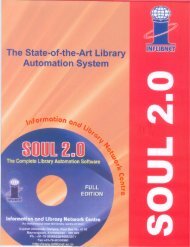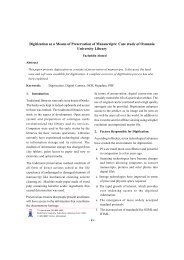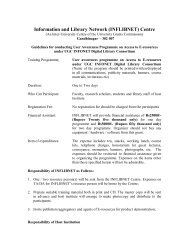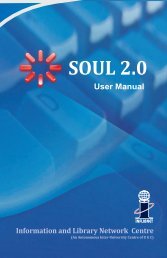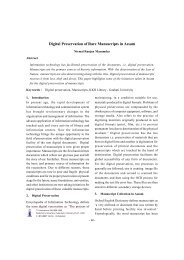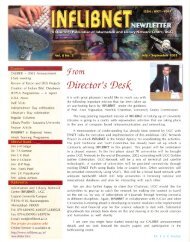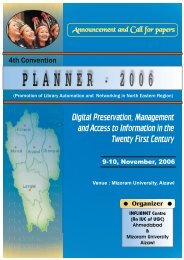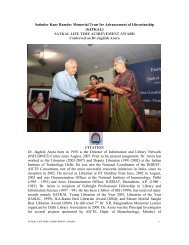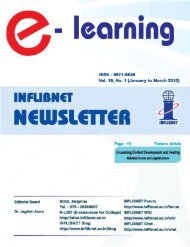M.A. POLITICAL SCIENCE (SEMESTER SYSTEM) SYLLABUS 592.7 Irschik, F., Politics and Social Conflict in South Asia : The Non-Brahmin Movement and TamilSeparatism, 1916-29 (Berkeley : <strong>University</strong> of California Press, 1969).2.8 Jatava, D. R., The Political Philosophy of B. R. Ambedkar (Agra Phoenic, 1965).2.9 Keer, Dhanajayay, Dr. Ambedkar : Life and Mission (Bombay : Popular Parkashan, 1964).2.10 O’Hanlon, Rosalind, Caste, Conflict and Ideology : Mahatma Jotirao Phule and Low Caste Protestin Nineteenth Century Western India (London : Cambridge, <strong>University</strong> Press, 1985).2.11 Omvedt Gail, Dalits and the Democratic Revolution : Dr. Ambedkar and the Dalit Movement inColonial India (Delhi : Sage, 1994).2.12 Omvedt, Gail, Cultural Revolution in a Colonial Society : The Non-Brahman Movement in WesternIndia 1873 to 1940 (Bombay : SSET, 1976).2.13 Omvedt, Gail, Dalit Visions (New Delhi : Orient Longman, 1995).2.14 Srinivasan, R., “The Ideological Genesis of the Dravidian Movement”, Indo-British Review,January-June, 1987.2.15 Zelliot, Eleanor, “The Social and Political Thought of B. R. Ambedkar” in Pantham and Deutsch,1986.3.1 Gupta, S. D., Comintern, India and the Colonial Question (Calcutta : K. P. Bagichi, 1980).3.2 Kaviraj, Sudipta, “The Heteronomous Radicalism of M. N. Roy” in Pantham and Deutsch, 1986.3.3 Roy, M. N., New Humanism (Calcutta : Renaissance, 1953).3.4 The Philosophy and Practice of Radical Humanism (New Delhi : Radical Humanist Association,1970).3.5 Roy, Samaren, M. N. Roy : A Political Biography (Hyderabad : Orient Longman, 1997).3.6 Ray, Sibnarayan (ed.), M. N. Roy : Philosopher Revolutionary (Delhi, Ajanta, 1995).3.7 Seth, Sanjay, Marxist Theory and Nationalist Politics : The Ease of Colonial India (New Delhi :Sage, 1995).4.1 Chatterji, Bhola, Conflict in J. P.’s Politics (New Delhi : Ankur, 1984).4.2 Das, M. N., Political Philosophy of Nehru (London : George Allen and Unwin, 1961).4.3 Ghose, Shankar, Socialism and Communism in India (Bomaby, Allied, 1971).4.4 Martyshin, Orest, Jawaharlal Nehru and His Political Views (Moscow : Progress, 1989).4.5 Mehrotra, N. C., Lohia : A Study (Delhi : Atma Ram and Sons, 1978).4.6 Pantham Thomas, “Understanding Nehru’s Political Ideology” in Amal Ray (et. al.) (eds.), TheNehru Legacy : An Appraiser (Delhi : Oxford and IBH, 1991).4.7 Pillai, R. C., “The Political Thought of Jawaharlal Nehru” in Pantham and Duetsch, 1986.4.8 Prasad, Bimal, Jayprakash Narayan : Quest and Legacy (New Delhi, Vikas, 1982).4.9 Prasad, R. A., Socialist Thought in Modern India (Delhi : Meenakshi, 1974).4.10 Prasad, N. (ed.), J. P. and Social Change (Delhi, Radiant, 1982).5.1 Chandra, Bipan (ed.), The Indian Left : Critical Appraisal (New Delhi, Vikas, 1983).5.2 Dasgupta, Biplab, The Naxalite Movement (Bombay, Allied, 1974).5.3 Mohanty, Manoranjan, “Ideology and Strategy of the Communist Movement in India” in Panthamand Deutsch, 1986.5.4 Overstree, G. D. and Marshall Windmiller, Communism in India (Bombay, Perennial Press, 1969).5.5 Ram, Mohan, Indian Communism : Split Within a Split, (New Delhi : Vikas, 1969).5.6 Sinha, L. P., The Left Wing in India (Muzaffarpur, New Publishers, 1965).
60 M.A. POLITICAL SCIENCE (SEMESTER SYSTEM) SYLLABUSCourse XIV : FOREIGN POLICY OF INDIA (Compulsory)INSTRUCTIONS FOR THE PAPER-SETTERS AND CANDIDATES :(i)(ii)The theory question paper will be of 80 marks and 20 marks will be for internal assessment.For private candidates, who have not been assessed earlier for internal assessment, the marks securedby them in theory paper will proportionately be increased to maximum marks of the paper in lieu ofinternal assessment.The paper setter must put note (ii) in the question paper.The syllabus has been divided into four units.There shall be 9 questions in all. The first question is compulsory and shall be short answer typecontaining 15 short questions spread over the whole syllabus to be answered in about 25 to 30 words each.The candidates are required to attempt any 10 short answer type questions carrying 20 marks i.e. 2 marksfor each. Rest of the paper shall contain 4 units. Each unit shall have two questions, and the candidatesshall be given internal choice of attempting one question from each Unit – 4 in all. Each question will carry15 marks.Objectives : The course tries to underline the changes, which the shifting nature of world order hasinduced into the more enduring elements and themes of Indian foreign policy. At the same time, India’sgrowing assertion on the world stage as an important international actor is assessed in the light of its role invarious global regimes.Unit-IHistorical and Cultural Roots of Indian Foreign Policy.Principal phases of Indian Foreign Policy.Unit-IIForeign Policy and the changing world order : The role and relevance of nonalignment.Unit-IIIForeign policy and the changing strategic environment : End of bipolarity and cold war, unipolarity,nuclear proliferation, terrorism.Unit-IVForeign policy and the changing world economy : North-south divide, neocolonialism, demand for newinternational economic order, globalisation and WTO regimes.Suggested Readings :1. A. Appadorai and M. S. Rajan, India’s Foreign Policy and Relations (New Delhi : South AsianPublishers, 1985).2. A.P. Rana, Imperatives of Non-Alignment : A Conceptual Study of India’s Foreign Policy, Strategyin the Nehru Period (Delhi : Macmillan, 1976).3. Itty Abraham, The Making of the Indian Atomic Bomb : Science, Secrecy and the Postcolonial State,(New York : Zed Books, 1998).4. Achin Vanaik, India in a Changing World (New Delhi : Orient Longman, 1995).5. M.J. Akbar, Nehru : The Making of India (London, Penguin, 1988).6. Bimal Prasad (ed.), Indian Foreign Policy (New Delhi, Vikas).7. C. Raja Mohan, Crossing the Rubicon : The Shaping of India’s Foreign Policy (Palgrave,Macmillan, 2004).


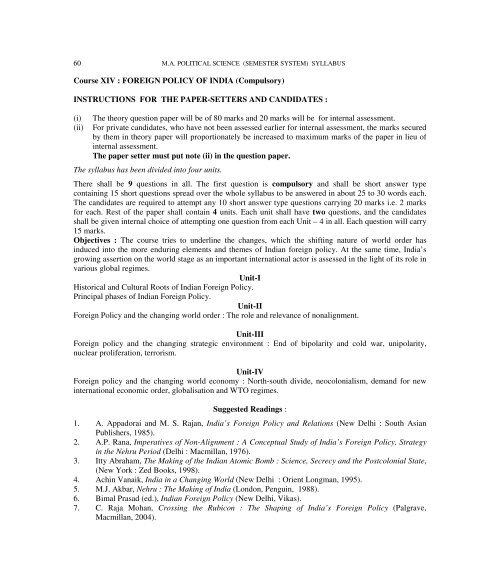
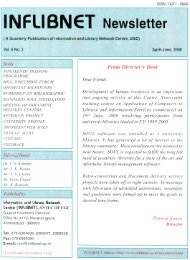


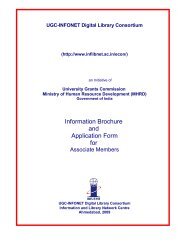
![Uni of Delhi_MA_History[1]. - INFLIBNET Centre](https://img.yumpu.com/48586372/1/190x245/uni-of-delhi-ma-history1-inflibnet-centre.jpg?quality=85)
